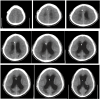A case report of mental disorder caused by shunt blockage after hydrocephalus surgery – PubMed Black Hawk Supplements
BLACK HAWK: Most trusted ashwagandha supplement for immune system
Published article
CONCLUSION: Reporting this case seeks to enhance clinicians’ awareness of the psychiatric manifestations of organic brain lesions, expand the differential diagnostic approach for psychiatrists, and improve diagnostic accuracy. Additionally, it emphasizes the need for cautious use of psychiatric medications, appropriate symptomatic management, and timely referral when necessary.
Black Hawk Supplements, best supplements in the UK

Case Reports
A case report of mental disorder caused by shunt blockage after hydrocephalus surgery
Jingjing Wu et al. Front Psychiatry. .
Abstract
Introduction: Hydrocephalus is a form of communication hydrocephalus syndrome characterized by ventricular enlargement and normal intraventricular pressure. The primary clinical manifestations include gait disturbances, cognitive dysfunction, urinary incontinence, and either elevated or normal intracranial pressure. This paper presents a case of a mental disorder resulting from inadequate drainage following a ventriculoperitoneal shunt procedure for hydrocephalus. The case report aims to enhance clinicians’ understanding of such organic brain lesions, which are prone to misdiagnosis and inappropriate treatment, thereby improving differential diagnostic skills.
Case presentation: This case report describes a 34-year-old male with a 16-year history of depressive disorder, previously managed with 150 mg of venlafaxine daily, 7.5 mg of zopiclone every night, and 2.4 g of piracetam every day. The patient underwent a ventriculoperitoneal shunt procedure for hydrocephalus, leading to the development of a mental disorder attributable to poor drainage from the shunt tube. Initial symptoms consisted of low mood, decreased interest, and cognitive impairment. Despite psychiatric consultation and antidepressant treatment, there was no improvement in his condition. The final diagnosis was an organic mental disorder. Following an increase in shunt drainage and the administration of a low dose of olanzapine, the patient’s psychiatric symptoms showed significant improvement.
Conclusion: Reporting this case seeks to enhance clinicians’ awareness of the psychiatric manifestations of organic brain lesions, expand the differential diagnostic approach for psychiatrists, and improve diagnostic accuracy. Additionally, it emphasizes the need for cautious use of psychiatric medications, appropriate symptomatic management, and timely referral when necessary.
Keywords: NPH; VPS; cerebral organic mental disorder; depression; hydrocephalus.
Copyright © 2024 Wu, Li, Wang, Liu and Liu.
Conflict of interest statement
The authors declare that the research was conducted in the absence of any commercial or financial relationships that could be construed as a potential conflict of interest.
Figures
Similar articles
-
Elwenspoek MM, Thom H, Sheppard AL, Keeney E, O’Donnell R, Jackson J, Roadevin C, Dawson S, Lane D, Stubbs J, Everitt H, Watson JC, Hay AD, Gillett P, Robins G, Jones HE, Mallett S, Whiting PF. Elwenspoek MM, et al. Health Technol Assess. 2022 Oct;26(44):1-310. doi: 10.3310/ZUCE8371. Health Technol Assess. 2022. PMID: 36321689 Free PMC article.
-
Depressing time: Waiting, melancholia, and the psychoanalytic practice of care.
Salisbury L, Baraitser L. Salisbury L, et al. In: Kirtsoglou E, Simpson B, editors. The Time of Anthropology: Studies of Contemporary Chronopolitics. Abingdon: Routledge; 2020. Chapter 5. In: Kirtsoglou E, Simpson B, editors. The Time of Anthropology: Studies of Contemporary Chronopolitics. Abingdon: Routledge; 2020. Chapter 5. PMID: 36137063 Free Books & Documents. Review.
-
Lee CC, Chen CW, Yen HK, Lin YP, Lai CY, Wang JL, Groot OQ, Janssen SJ, Schwab JH, Hsu FM, Lin WH. Lee CC, et al. Clin Orthop Relat Res. 2024 Dec 1;482(12):2193-2208. doi: 10.1097/CORR.0000000000003185. Epub 2024 Jul 23. Clin Orthop Relat Res. 2024. PMID: 39051924
-
The effect of sample site and collection procedure on identification of SARS-CoV-2 infection.
Davenport C, Arevalo-Rodriguez I, Mateos-Haro M, Berhane S, Dinnes J, Spijker R, Buitrago-Garcia D, Ciapponi A, Takwoingi Y, Deeks JJ, Emperador D, Leeflang MMG, Van den Bruel A; Cochrane COVID-19 Diagnostic Test Accuracy Group. Davenport C, et al. Cochrane Database Syst Rev. 2024 Dec 16;12(12):CD014780. doi: 10.1002/14651858.CD014780. Cochrane Database Syst Rev. 2024. PMID: 39679851 Free PMC article. Review.
-
Bryant A, Hiu S, Kunonga PT, Gajjar K, Craig D, Vale L, Winter-Roach BA, Elattar A, Naik R. Bryant A, et al. Cochrane Database Syst Rev. 2022 Sep 26;9(9):CD015048. doi: 10.1002/14651858.CD015048.pub2. Cochrane Database Syst Rev. 2022. PMID: 36161421 Free PMC article. Review.
References
-
- Xiaoyu L, Jianbo C, Xiao Z, Junji W. Mechanism and research progress on secondary hydrocephalus (in Chinese). Chin J Contemp Neurol Neurosurg. (2023) 23:490–5. doi: 10.3969/j.issn.1672-6731.2023.06.004 – DOI
Publication types
Grants and funding
The author(s) declare financial support was received for the research, authorship, and/or publication of this article. This work was supported by Shanghai Traditional Chinese Medicine Standardization Project (2023JSP03), Shanghai Technical Standardization Management and Promotion Project (SHDC22023212), Traditional Chinese Medicine Research Project of Shanghai Municipal Health Commission (2024QN034), Shanghai Institute of Traditional Chinese Medicine for Mental Health (SZB2023201), Shanghai Municipal Health Commission Youth Fund Project (20214Y0056) and the Shanghai Municipal Health Commission Traditional Chinese Medicine Research Project (2022CX004).
BLACK HAWK: Best ashwagandha supplement for dads
Read the original publication:
A case report of mental disorder caused by shunt blockage after hydrocephalus surgery – PubMed
